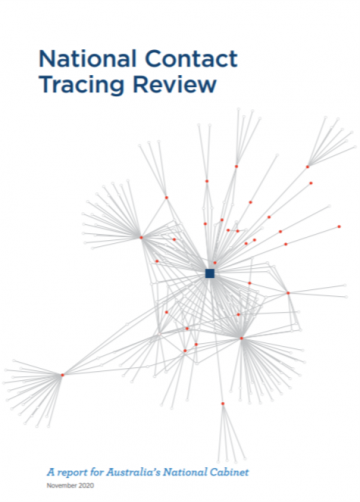Finkel panel testing and tracing report adopted by National Cabinet

National Cabinet agreed unanimously on Friday, November 13, to the recommendations of a COVID-19 testing and contact tracing report from a panel headed by Australia’s Chief Scientist, Dr Alan Finkel.
The report sets out the characteristics of an optimal system for testing, contact tracing and managing COVID-19 outbreaks, which states and territories can use to evaluate and refine their own measures.
The aim is to ensure Australia can reopen internal borders safely. Speaking at a press conference alongside Prime Minister Scott Morrison after the National Cabinet meeting, Dr Finkel said the states and territories can reopen their borders if they have confidence in the measures in place in other jurisdictions.
In preparing the report, he and the other members of his panel travelled around the country to talk with each jurisdiction and assess the country’s preparedness to reopen internal borders.
The overriding conclusion was that there was good reason to be confident, he said. The panel had seen “fabulous evidence of well-established enduring systems in many of the states and territories, and progress towards that in the ones that started a little bit behind at the beginning of the year,” he said.
“But as was pointed out to me again and again and again, that is the second line of defence. Critically important are the preventative measures, which start from the responsibility of the individual, through hygiene practices and staying at home if unwell, through physical distancing, and other measures at a more macroscopic level such as limiting, appropriately, access to high-risk facilities such as aged care.”
But he said the virus was difficult to understand and had caused havoc around the world. So even with low or no confirmed coronavirus cases, Australia could not afford to rest on its laurels.
The report recommends that all states and territories adopt a shorter turnaround for notifying close contacts that they must quarantine. The national target has been 48 hours from a confirmed test result to notifying close contacts. But the panel recommended, and National Cabinet has now agreed, that the 48 hour clock should start from the time a swab is taken, not from the reporting of a confirmed test result.
National Cabinet has also agreed that test results should be provided to patients less than 24 hours from when a test swab is taken, a time short enough that people will not be discouraged from taking a test.
The panel recommended a digital exchange be developed to speed case and contact tracing across domestic borders. The system would allow states to share information digitally about confirmed cases and close contacts. Dr Finkel said the exchange would be “light touch”. It would only allow the sharing of information relevant to contact tracing, such as phone numbers, addresses and test results, and no data would be stored in the exchange itself, making it a small target for cyber attack, as well as protecting privacy and meaning no need to reconcile different databases.
Chief Health Officer Paul Kelly said National Cabinet had agreed that a data exchange system would be piloted between the Commonwealth, the ACT, Victoria and NSW.
The panel also recommended implementation of as much digitisation as possible from the time a swab is taken at the point of testing, through to reporting results reporting and interviews with positive cases and contacts.
“Never again should a case interview fall through the cracks,” Dr Finkel said.
“The combination of those three things – public health expertise, good preventative measures in place that are well communicated, and the increasing use of technology – I think should give states, whether it’s the leadership or the population, confidence that Australia, certainly in comparison to the rest of the world, but also in an absolute sense, is in a good place; not perfect, but in a good place and somewhere I’m certainly happy to be.”
Mr Morrison told the press conference that the task was to reopen safely and then to stay safely open.
The other members of Dr Finkel’s panel were Tarun Weeramanthri, president of the Public Health Association of Australia, and Leigh Jasper, co-founder of Aconex.
The report is available on the Department of Health’s website and you can watch the press conference where Dr Finkel explained the findings of the report here.
